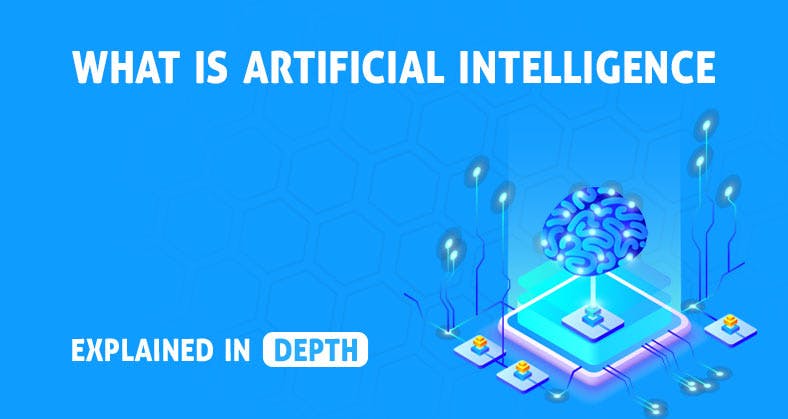What is Artificial Intelligence | Is it the future?
For the last few years, Artificial Intelligence has been taking over various fields with its functionalities. Artificial Intelligence, in short AI, focuses on building and managing technologies that can teach itself autonomously to make decisions and carry out actions almost similar to a natural brain. Let’s move forward towards the introduction of What is artificial intelligence…

In order to properly understand what Artificial Intelligence is, you need to go through the Origin of AI, Its variations, Working principles, Practical uses, and other major points, which we have covered throughout the article in several steps.
Origin
According to sources (opens in a new tab), Intelligent robots and artificial beings first appeared in the ancient Greek myths of Antiquity. The seeds of modern Artificial Intelligence were planted by classical philosophers who described the process of human thinking as the mechanical manipulation of symbols.
In the year 1950, “Computing Machinery and Intelligence” was published by Alan Turing. One year later in 1951, the earliest successful AI program was written by Christopher Strachey. By the summer of next year, the program was able to play a complete game of checkers at a reasonable speed.
Thus AI kept being modified years after years by new and improved algorithms, research, and implementations.
Types of AI
Before moving forward, You need to know that people often tend to think that Artificial Intelligence, Machine learning & Deep learning are the same since they have common applications in practical.
Confusions do happen while dividing Artificial Intelligence systems into different categories, though according to solid researches. Based on different types of Applications, AI can be divided into many categories. In general, there are mostly 4 types of AI,
-
Reactive Machines AI: It includes machines that operate solely based on the present data, taking only the current situation into account.
-
Limited Memory AI: Limited Memory AI can make informed and improved decisions by studying the past data from its memory.
-
Theory Of Mind AI: With more advance systems, this category of machines is speculated to play a major role in psychology, thus it has the ability to focus mainly on emotional intelligence so that human believes and thoughts can be perceived.
-
Self-aware AI: As you might be guessing, in this stage AI will achie a stage of super intelligence in itself. However, it may sound unusual, this could be helpful to Mankind or possibly could end up inadequately.
How Does AI Work?
Have you ever seen how Google suggests products, articles, or videos based on your interest without you searching for it? Well, it uses such a complex algorithm that collects information like your location, previous search history, sites you visit, your age, interests. After analyzing your actions, AI processes them and predicts what you’re looking for. Basically, AI uses computational power to exceed what a human is capable of thinking.
Artificial Intelligence is a diverse domain of systems. It covers and implements topics like – Machine learning, Deep learning, Neural networks, Natural language processing, Knowledge base, Expert system, Computer vision processing, and so on.
Fact: Sophia, a lifelike humanoid with Artificial Intelligence, has gained guaranteed citizenship of Saudi Arabia.
Uses of AI
Artificial Intelligence has become so general in our daily lives that we do not even realize how often we use it. Wondering what could be the simplest example of AI in your daily routine?
You’re reading this article, if you’ve searched it via Google or asked Alexa to set a routine, you have interacted with Artificial Intelligence. Besides these, AI helps humans in Healthcare, Agriculture, Defense, Marketing, Automobiles, ECommerce, and numerous more fields. Again these are the most used and straightforward examples of AI, we’ll discuss important uses of AI with easily understandable examples in a different article.
Related: Bendable Microprocessors can change the world (opens in a new tab)
WIll AI kill jobs?
No, AI may have the potential to replace a large proportion of existing human jobs, but eventually, It will create millions of more jobs than it will destroy. Obviously, the job vacancies will lean towards Technical industries, still, It is easier to see existing jobs getting disrupted by AI than to envision what new jobs the technology will accredit.
Conclusion
This was a quick and ‘To the point‘ Article about What is Artificial Intelligence, I hope I was able to give you brief but pinpoint accurate information about AI & its basic concepts. If you’re interested in Machine learning and Deep learning as well, consider sticking with us for further informative content.
Soon after publishing this article ‘What is Artificial Intelligence,’ we are planning to discuss what are the major problems Humans can face due to the creation of Advance AI systems.
